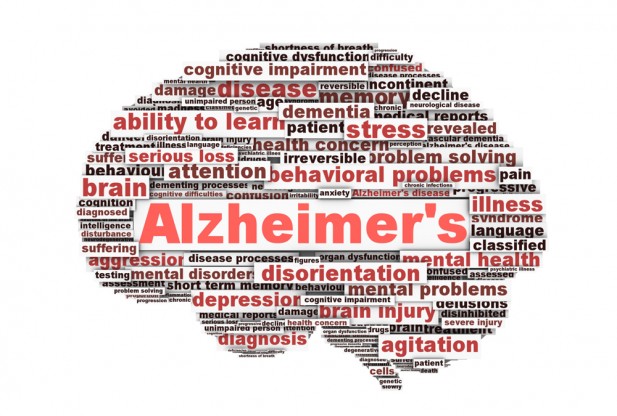She sat in the brightly lit front of the doctor’s office, her age-weathered hands rested on her lap. Her reason for coming to the doctor had been small: she’d been a little more forgetful than normal, and she got confused a couple of times. Friends and family had noticed more than she did and urged her to make an appointment. She had assumed that her forgetfulness was simply a part of ageing, or the symptom of something mundane. Maybe she wasn’t getting enough sleep? Maybe she needed to eat better? Maybe she just needed to take vitamins? Everyone was always going on about vitamins…
It wasn’t until the tests were ordered that she began to think that there could be something seriously wrong. The shuffle of nurses and doctors walking through the hallway reached her in a muted echo through the closed door, as she anxiously waited to find out what those tests had discovered. Medical posters on the bleak, pale walls offered little distraction as the senses of dread and worry steadily mounted with each passing moment. Then, the door finally opened. Her attention snapped to the young doctor that entered and greeted her. His voice filled the room with a tone conveying sympathy as he spoke the words she never expected to hear. She listened as he told her that she had a disease – one that could not be cured, that would chip away at her identity, steal her ability to care for herself, and shorten her life. The stark reality of her situation set in when she heard the final seven words: “There is nothing that can be done…”
This type of scenario has been experienced by the 46 million people worldwide that have been diagnosed with Alzheimer’s Disease (AD). Making up 60% to 70% of dementia cases, AD is one of the most prevalent diseases in the Western world. To date, a cure has not been discovered and there is no clinical proof that anything can slow down the progression of the disease. However, research into the disease is ongoing, and although it is not complete, there have been a couple of breakthroughs that lend hope to finding methods to prevent the disease, as well as delay the progression.

Table of Contents
Omega-3 for Alzheimer’s and mental health
Omega-3 fatty acids have a strong association with mental function and are considered essential for brain health. It has been shown to be beneficial for mental disorders such as depression, anxiety, bipolar disorder, and ADHD. Recent research is now showing that taking omega-3 for Alzheimer’s may help prevent and even treat this condition as well.
With omega-3 being an integral part of a healthy diet, a deficiency of these fatty acids has been linked to a raised risk for a plethora of health ailments. It’s likely that AD is soon to be added to that list.
Studies have found that high omega-3 consumption is associated with a reduced risk in developing AD. Although very few human trials have been conducted, studies involving mice and rats that were given DHA supplementation over a lifetime resulted in an improvement of AD symptoms. In contrast, the study group that was given DHA only after symptoms occurred did not experience the same amount of improvement. This suggests that DHA has neuroprotective properties and that a deficiency of this fatty acid could contribute to both the onset and the progression of the disease.
Omega-3 fights off amyloid plaque
Omega-3 fish oil has also shown some promise at battling one of the suspected causes of AD: amyloid plaque. This plaque is an accumulation of beta-amyloid protein. Chemically speaking, it would be considered a sticky substance and this means that it can easily clump together. In AD, an unidentified enzyme breaks the protein down into smaller fragments, worsening the clumping issue. These clumps are deposited in the brain and interfere with the transmission of signals by blocking them. Over time, this contributes to the loss of neurons and causes the affected sections of the brain to begin dying.
Using dietary DHA, a study showed a reduction of amyloid plaque in the hippocampus and parietal cortex – two areas that are heavily affected by AD. The reduction of the plaque build-up was significant and measured at up to 50%. While this would not indicate a cure, the finding highlights a potential for omega-3 being used to slow down the disease by reducing the amount of interference in brain signalling.
Omega-3 fights inflammation
Inflammation is another suspect in the cause and progression of AD. Neurons are linked to immunological mechanisms within the brain and it is thought that the build-up of amyloid plaque, along with a few other mechanisms associated with AD, may trigger an inflammatory response from the immune system. The inflammation may cause damage that will speed up the progression of the disease.
Omega-3 fatty acids got their initial claim to fame due to their anti-inflammatory properties. Keeping the ratio of omega-3 and omega-6 even has been proven to cut down on inflammation. Although omega-6 inflammation hasn’t been thoroughly studied with Alzheimer’s Disease patients, the anti-inflammatory properties of omega-3 fish oil could possibly provide protection against the rapid decline seen with the disease.
Within the few studies involving Alzheimer’s Disease patients, omega-3 has shown some effectiveness, but it is selective. Many of the research findings contradict each other and there is quite a bit of debate on the issue. However, the majority of studies indicate that while omega-3 does not have much effect in the later stages of AD, it can cause improvement in the very early stages.
Patients with only a mild cognitive impairment that were given an omega-3 supplement appeared to experience improvement and did not progress into the latter stages as quickly as the group that was not supplemented with omega-3. That result implies that if caught at the earliest stages, omega-3 may help slow down the disease.
Final words on taking omega-3 for Alzheimer’s
Alzheimer’s Disease is a fatal disease that, according to western medicine, cannot be cured or slowed, but it may not have that status for long. Research is consistently ongoing and each breakthrough leads us closer to a more efficient treatment. The role omega-3 could play in treating the disease is not entirely understood and more research is definitely needed. Yet, we know that omega-3 does affect Alzheimer’s, as well as the mechanisms behind the disease, and it holds the potential for being both a part of future treatments and a tool for preventive care. With more research into the effects of omega-3 on Alzheimer’s, it’s possible that there will be a time when “There is nothing that can be done” will no longer apply to Alzheimer’s Disease.
💬 Something on your mind? Share your thoughts in the comments. We love hearing from curious minds.
📩 And while you’re here, join our newsletter for more smart stuff (and secret perks)!
References:
- Cunnane, S., Chouinard-Watkins, R., Castellano, C., & Barberger-Gateau, P. (2013). Docosahexaenoic acid homeostasis, brain aging and Alzheimer’s disease: Can we reconcile the evidence? Prostaglandins, Leukotrienes and Essential Fatty Acids (PLEFA), 88(1), 61-70. doi:10.1016/j.plefa.2012.04.006
- Jicha, G. (2010). Omega-3 fatty acids: Potential role in the management of early Alzheimer’s disease. CIA Clinical Interventions in Aging, 5, 45-61. Retrieved September 2, 2015, from http://www.ncbi.nlm.nih.gov/pmc/articles/PMC2854051/
- Lim, G. (2005). A Diet Enriched with the Omega-3 Fatty Acid Docosahexaenoic Acid Reduces Amyloid Burden in an Aged Alzheimer Mouse Model. Journal of Neuroscience, 25(12), 3032-3040. doi:10.1523/JNEUROSCI.4225-04.2005
- Michael Havens (Photographer). (2015 June 17).Alzheimer’s [digital image]. Re-sized. Retrieved from http://www.patientcaretechniciansalary.net/
- Pasker-de Jong, P., De Vries, R., & Ritskes-Hoitinga, M. (2012). The Effects of Long-Term Omega-3 Fatty Acid Supplementation on Cognition and Alzheimer’s Pathology in Animal Models of Alzheimer’s Disease: A Systematic Review and Meta-Analysis. Journal of Alzheimer’s Disease, 28(1), 191-209. doi:10.3233/JAD-2011-111217
- Swanson, D., Block, R., & Mousa, S. (2012). Omega-3 Fatty Acids EPA and DHA: Health Benefits Throughout Life. Advances in Nutrition: An International Review Journal, 3, 1-7. doi:10.3945/ an.111.000893
- The Global Impact of Dementia. (n.d.). Retrieved September 2, 2015, from http://www.worldalzreport2015.org/





